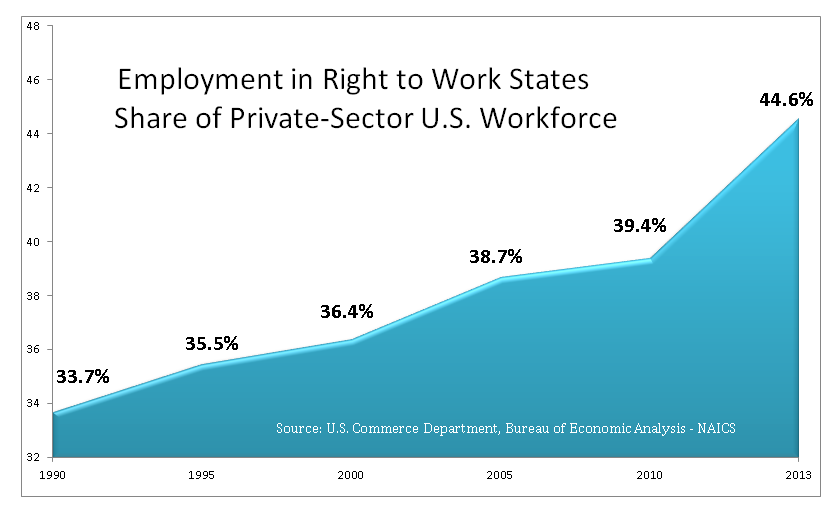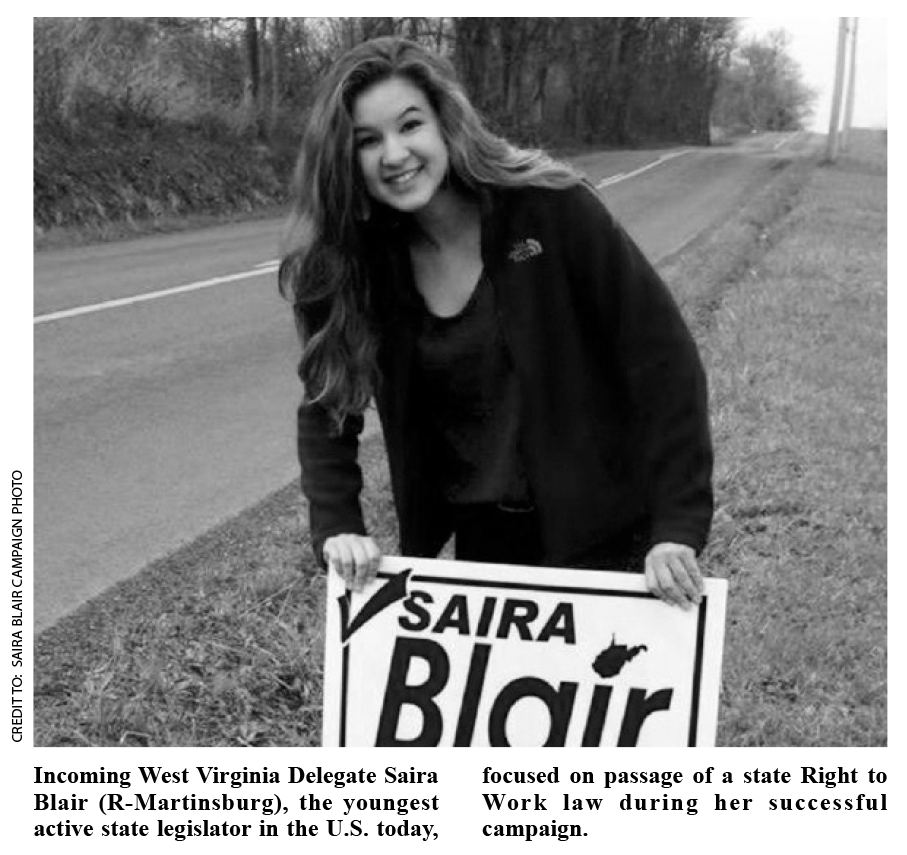Will Team Biden Weaponize Workers’ Pensions?
Big Labor abuse of worker pension and benefit funds as a means of advancing union bosses’ self-aggrandizing policy objectives is a familiar phenomenon.
Bans on Forced Union Dues Expected to Come up For Roll-Call Votes
(Source: the January 2015 National Right to Work Committee Newsletter)
 With the vast majority of state legislatures across the country convening for their 2015 sessions this month or next, proponents of compulsory union dues and fees are clearly on the defensive.
With the vast majority of state legislatures across the country convening for their 2015 sessions this month or next, proponents of compulsory union dues and fees are clearly on the defensive.
Thanks in significant part to the enactment in 2012 of the 23rd and 24th Right to Work laws in Indiana and Michigan, respectively, today roughly 45% of all private-sector workers are employed in one of the states that prohibit forcing workers to bankroll a union as a job condition.
As recently as 2010, fewer than four in 10 private-sector employees held jobs in states protected by Right to Work laws. And just a quarter-century ago, fewer than 34% of private-sector jobs were located in Right to Work states.
‘Where Indiana Goes, So Goes the Nation’?
“The enactments of the Indiana Right to Work law in February 2012 and the Michigan Right to Work law 10 months later have, it seems, greatly loosened Big Labor’s grip over elected officials in many other states,” commented National Right to Work Committee President Mark Mix.
“In early 2012, Abby Rapoport, then a staff writer for the pro-forced unionism American Prospect, publicly expressed her fear that the Right to Work victory in Indiana would represent ‘a turning point in American labor history’ and ‘not simply a loss in power’ for Hoosier union officials.
“An article by Ms. Rapoport published online the day then-Gov. Mitch Daniels signed the Right to Work Bill into law even bore the title, ‘Where Indiana Goes, so Goes the Nation.’
“And since Indiana’s ban on forced union dues was adopted, Right to Work activism has indeed spread like wildfire in state after state.
“It seems the fears of Abby Rapoport and the American Prospect’s editors were well-grounded.”
Support to Pass Right to Work Laws Advancing In Multiple States
Mr. Mix cited West Virginia as just one example of a longtime Big Labor dominion where momentum for enactment of a state Right to Work law has increased significantly in the wake of the 2014 elections.
“Last year, Mountain State voters elected a total of 37 avowedly pro-Right to Work members to their state House of Delegates. Prior to the elections, just 16 of the chamber’s members had gone on record in opposition to the firing of employees for refusal to bankroll a union,” explained Mr. Mix.
“Thanks to the major shift in the composition of the House of Delegates, this year the chamber’s former minority leader, Republican Tim Armstead [Kanawha County], will be the speaker. And Mr. Armstead is an unabashed advocate of making West Virginia a Right to Work state.
“Moreover, a number of rank-and-file West Virginia legislators have already expressed strong public support for debating and voting on Right to Work legislation this year.”
 One very notable example is Saira Blair, an 18-year-old West Virginia University freshman and incoming delegate (R-Martinsburg) who will be the youngest active lawmaker in the U.S. this year.
One very notable example is Saira Blair, an 18-year-old West Virginia University freshman and incoming delegate (R-Martinsburg) who will be the youngest active lawmaker in the U.S. this year.
Kentucky Court: ‘Political Subdivisions’ Have ‘No Power’ to Bar Forced Dues
When Eliza Gray of Time magazine asked Ms. Blair what she intended to do in Charleston after first ousting a 67-year-old GOP incumbent in a May primary election and then defeating union-label Democrat Layne Diehl in the general election, the incoming delegate focused immediately on employee freedom:
“I’ve watched too many people get a high school and college education and then leave the state because they cannot get a good-paying job. I want to get jobs to West Virginia and one of the biggest ways would be making West Virginia a Right to Work state.”
In addition to West Virginia, New Hampshire, Wisconsin, New Mexico, Pennsylvania, Montana, Missouri, Delaware and Maine are some of the states where legislative debates and roll-call votes on Right to Work measures are likely or very possible this year.
One other way elected officials have recently responded to intensifying public support for the Right to Work is to try to address the evils of compulsory unionism at the local level.
Just before this edition of the National Right to Work Newsletter went to press, one county (Warren) in Kentucky adopted an ordinance prohibiting forced union dues and fees, and two other Bluegrass State counties (Fulton and Simpson) seemed to be moving towards adoption of similar measures.
Mr. Mix commended pro-Right to Work Kentucky legislators in Warren County, especially the two Democrats who voted “aye,” for standing up to United Auto Workers (UAW) and other union bosses who have viciously attacked them.
Unfortunately, although the Warren County leaders’ hearts are in the right place, the only way Kentucky citizens can really protect employees’ Right to Work is to fight with all their strength for passage of a statewide Right to Work law.
The fact is, in 1990, a federal court ruled in Local 1564 v. City of Clovis that, under the 1947 Taft-Hartley Act, cities and other localities may not protect private-sector employees from being fired for refusal to bankroll a union. Even if state lawmakers have explicitly authorized localities to safeguard the Right to Work, they can’t, the opinion indicated.
And in 1965, the Kentucky Court of Appeals similarly overturned a local Right to Work ordinance.
According to the holding of the Kentucky court, “Congress has pre-empted the field of regulation of [forced union dues and fees] to the extent that local political subdivisions of a state have no power to legislate” in the field.
‘There Is No “Royal Road” to Right to Work Passage’
The reality is that it takes strong grass-roots mobilization programs, carefully planned and implemented by Right to Work supporters over multiple election cycles, to pass a statutory ban on compulsory unionism that will withstand Big Labor legal attacks and truly protect workers’ freedom of choice.
In assessing Kentucky localities’ current efforts to combat Big Labor, Mr. Mix commented:
“Euclid is said to have replied to King Ptolemy’s request for an easier way of learning mathematics that ‘there is no royal road to geometry.’
“Multiple attempts by well-intentioned citizens in state after state to deal with the scourge of forced union dues and fees quickly by somehow circumventing opposition in their state legislatures have all proven futile.
“Just as there is ‘no royal road to geometry,’ there is no ‘royal road’ to Right to Work passage.
“The only proven means of counterbalancing Big Labor’s forced dues-funded clout is to get Right to Work supporters actively involved in lobbying their legislative candidates on this issue through state Survey programs.
“Through persistent work over the course of several election cycles, citizens can indeed bring about fundamental change in the character of their state legislatures. And such change will ultimately lead to passage of Right to Work legislation.”

Big Labor abuse of worker pension and benefit funds as a means of advancing union bosses’ self-aggrandizing policy objectives is a familiar phenomenon.

Leaked CTU Proposals Won’t Do Anything to Improve Schools’ Poor Performance

What impact does handing a union monopoly power to deal with your employer on matters concerning your pay, benefits, and work rules have on your pay?